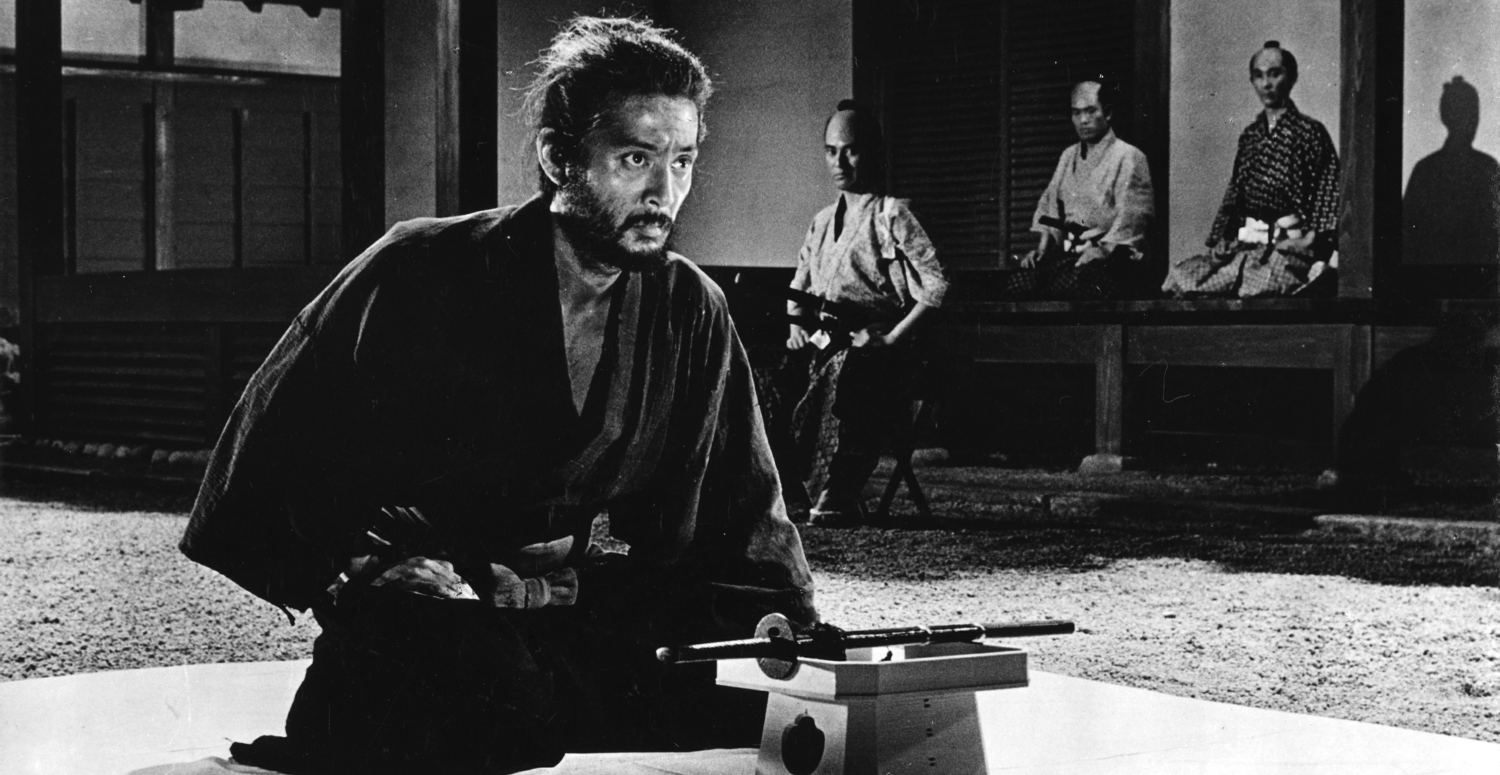Hara-Kiri
切腹 – Seppuku
Prix du Jury – Cannes
1962

FR EN
A l’occasion de notre 500e critique, nous vous proposons de mettre à l’honneur un chef-d’œuvre des années 1960 avec l’inoubliable « Hara-Kiri » de Masaki Kobayashi qui remporta le Prix du Jury au Festival de Cannes en 1963.
Contemporain du célèbre Akira Kurosawa, Kobayashi est devenu moins connu mais reste un réalisateur japonais engagé mettant surtout en scène des personnages idéalistes luttant contre un système, de la corruption aux horreurs de la guerre en passant par le culte des traditions.
Dans ce film de chanbara, Kobayashi met ainsi en scène un rōnin sans travail parmi tant d’autres dans un Japon en paix dirigé de main de fer par le shogunat du XVIIe siècle, qui décide de frapper à la porte d’un des puissants clans toujours en place après les guerres. Il demande alors à l’intendant du clan, la permission d’accomplir le seppuku traditionnel, le suicide rituel du samouraï aussi connu sous le nom d’harakiri, dans leur résidence. Commence alors un double récit se recoupant pour culminer sur l’explication de la volonté du rōnin et l’accomplissement de son destin.
Kobayashi signe ici un film d’une grande cruauté en gérant avec maestria la tension crescendo et l’avènement de la violence presque exclusivement à travers l’intensité du jeu de Tatsuya Nakadai et son regard perçant. La photographie dans un noir et blanc violemment contrasté et la bande originale de Tōru Takemitsu viennent renforcer la puissance de l’histoire. Si son combat final, tout comme la structure du scénario d’ailleurs, a inspiré de nombreux films dont le célèbre « Kill Bill » de Tarantino, « Hara Kiri » reste avant tout une critique du système féodal et du pouvoir japonais vide de sens dans un cadre de film de samouraï. La figure du Shogun vide ouvrant et clôturant le film ainsi que la volonté absolue d’étouffer les erreurs commises sous prétexte de tradition et de réputation démontrent parfaitement le message du réalisateur.
Un film à voir et à ne pas oublier ! Un remake japonais très fidèle est par ailleurs sorti et fut présenté à Cannes en 2011.
Raphaël Sallenave
To celebrate our 500th review, we want to honor a masterpiece of the 1960’s with the unforgettable “Harakiri” by Masaki Kobayashi which won the Jury Prize at the Cannes Film Festival in 1963.
While he was around at the same time of the famous Akira Kurosawa, Kobayashi has become less well known but remains a politically committed Japanese director who mainly portrays idealistic characters fighting against a system, from corruption to the horrors of war as well as the cult of tradition.
In this chanbara movie, Kobayashi depicts an unemployed rōnin among many others in a peaceful Japan ruled with an iron fist by the 17th century shogunate, who decides to come to the doors of one of the powerful clans still in power after the wars. He then asks the clan’s steward for permission to perform the traditional seppuku, the ritual suicide of the samurai also known as harakiri, in their compound. A double narrative then begins, intersecting to culminate in the explanation of the rōnin’s will and the fulfillment of his destiny.
Kobayashi has created a film of great cruelty by masterfully managing the crescendo of tension and the advent of violence almost exclusively through the intensity of Tatsuya Nakadai’s acting and his penetrating look. The photography in a violently contrasting black and white and the original score by Tōru Takemitsu enhance the power of the story. If its final battle, as well as the structure of the script, has inspired many films, including Tarantino’s famous “Kill Bill”, “Harakiri” remains above all a critique of the feudal system and of the Japanese power devoid of meaning within a samurai film setting. The figure of the empty Shogun opening and closing the film as well as the absolute will to cover up the mistakes made under the guise of tradition and reputation perfectly illustrate the director’s statement.
This is a film to see and not to forget! A very faithful Japanese remake was by the way later released and presented at Cannes in 2011.
Raphaël Sallenave

